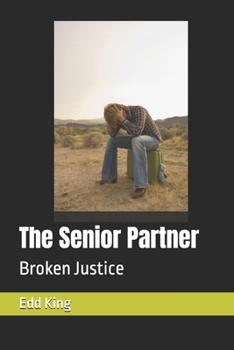The Senior Partner: Broken Justice
This book is an account of the failings of the UK criminal justice system CJS] where decent, law-abiding people are convicted of offences and often sent to prison, such as my subject, John, a lawyer who was jailed on trumped-up charges by the senior partner of a failing firm and whose relationship with my subject was 'toxic'. This case highlights failings; the police not investigating a crime but taking at face-value accusations made by the complainant; of the defence solicitors involved who fail to understand the nature of the alleged crimes and often wrongly advise a defendant to plead guilty to receive a lesser sentence; of the criminal barristers usually all self-employed who are miserably recompensed by the legal aid fund and who are understandably keen to move on to their next and perhaps more lucrative assignment, and so fail to prepare for a trial in many cases having received a brief the day before trial. Or are just incompetent; the crown prosecution service lawyers who often do not bother to question the evidence and miss the obvious or where the very wording of the charges demanded further investigation; an accuser who has an ulterior motive in pursuing the accused and over-stating the case by fabrication of evidence and failing to disclose evidence helpful to the defence; and the grooming of witnesses; then the Criminal Cases Review Commission, grossly underfunded and whose limited powers leave many people wrongly convicted and unable to obtain redress, and who deal with one or two percent only of the cases referred to them; delays in getting a case heard which means genuinely innocent persons suffering added mental anguish at not having their day in court sometimes for years and unable to keep his job or find employment. Look at the first few pages of Michael Naughton's 'Wrongful convictions: towards a zemiological analysis of the tradition of criminal justice system reform'. In the history of England and Wales' Criminal Justice System a discernible tradition of CJS reform emerges that exhibits the following discursive rules. At particular times, particular wrongful conviction cases are debated. In these debates, these particular cases attain a high profile 'miscarriage' status that throws the government, legal and public/media spheres into chaotic collision. As a result, legislative reforms have to be introduced to the CJS that serve to resolve the situation whereupon normality between and within the colliding spheres can, at least, be temporarily resumed. Within this discernible tradition, this article applies ideas derived from zemiology (the science/study of societal harm - social, physical, psychological and financial) and focuses upon some of the broader consequences of wrongful criminal convictions and/or miscarriages of the CJS. In particular, the article attempts to emphasis: the routine, as opposed to the exceptional, nature of miscarriages of the CJS; the zemiological costs of these to both the victims and to the public; the way that recognition of the above is obscured beneath the publicity that surrounds exceptional cases; and the failure of governments to act except in times of extreme public pressure, when knowledge of these is evident in the published statistics available. And an article by Jonathan James, Legal editor of The Times. Friday August 5th 2022. A legal watchdog is to review whether appealing against alleged miscarriages of justice is too difficult because the test which judges use is overly harsh.
If you work in the legal profession or want to, this is an eye opener, a must-read. John has had to live with this for nigh-on 30 years and has decided he has had enough; he lost the job he loved, lost his self-respect and the beautiful house he built for his family. John's story must be heard. But he is only one of an estimated 700 known wrongful convictions over the last decade or so.
Related Subjects
Law




